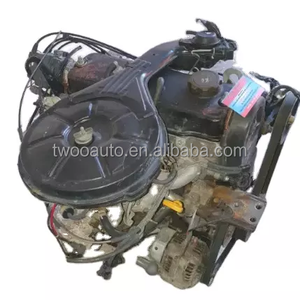Update Your Adventure with Genuine Toyota Tazz Engine for Sale
Update Your Adventure with Genuine Toyota Tazz Engine for Sale
Blog Article
Engine Purchasing Specialist Tips on Choosing the Right Engine for Your Particular Needs
Choosing the ideal engine for your details demands includes an intricate interplay of variables that go past simple horse power figures. By diving right into the complexities of power versus efficiency, evaluating fuel scores, and budgeting for long-term expenses, one can genuinely enhance their engine choice.
Power Vs. Performance: Discovering the Equilibrium

When selecting an engine, it is essential to strike a balance in between power and efficiency to satisfy your specific needs effectively. Power refers to the engine's ability to produce power for propulsion, figuring out factors like velocity, towing capability, and general performance (Toyota Tazz Engine For Sale). On the other hand, efficiency associates with exactly how well the engine utilizes fuel to generate power, affecting factors such as gas economic situation and ecological friendliness
Achieving the best balance between power and effectiveness is essential because an engine that is also powerful may take in excessive fuel, leading to greater operating expense and unnecessary stress on the atmosphere. On the other hand, an engine that prioritizes efficiency over power might lead to sluggish efficiency, especially popular scenarios like lugging hefty tons or driving uphill.
To make a notified decision, consider aspects such as your common driving problems, the intended use the vehicle, and your individual choices. By reviewing your top priorities and demands, you can select an engine that strikes the ideal equilibrium in between power and performance, ensuring optimal performance while decreasing ecological impact and operating prices.
Recognizing Engine Dimension and Kind

In addition, engine type plays a crucial role in figuring out the performance features of an engine. Common engine types include inline engines, V engines, and rotating engines, each with its unique advantages and disadvantages. The engine kind influences variables such as the engine's size, weight distribution, and power delivery. Recognizing the interplay in between engine size and type is important in selecting an engine that lines up with your certain needs and concerns, whether it be power, efficiency, or an equilibrium of both.
Consider Your Car's Demands
If you are looking for an engine for a sturdy truck that will be used for towing, you will certainly require a powerful engine with high torque capacities. On the various other hand, if you are picking an engine for a small auto mainly utilized for city travelling, fuel performance may be a much more important aspect to think about.

Examining Fuel Effectiveness Ratings
Assessing gas performance ratings is an important element of selecting the browse around this site right engine for Continue your vehicle, guaranteeing price financial savings and ecological sustainability. Gas efficiency ratings, typically measured in miles per gallon (MPG) for gasoline engines or kilowatt-hours per 100 miles (kWh/100 miles) for electric engines, show just how far an automobile can take a trip on a details quantity of gas or power. Higher MPG or reduced kWh/100 miles worths signify more efficient engines, converting to lowered gas prices and lower carbon exhausts.
When reviewing gas effectiveness scores, consider your driving needs and behaviors. If you commute long distances daily, a highly fuel-efficient engine can result in substantial savings with time. In addition, contrast different engine choices within the very same vehicle class to determine the most cost-effective selection. Factors such as engine size, weight, the rules of aerodynamics, and crossbreed or check out this site electric abilities can all affect fuel effectiveness.
Budgeting for Long-Term Costs
Tactically intending for long-term expenditures is crucial when selecting an engine, guaranteeing monetary sustainability over the car's life expectancy. While the first purchase cost of an engine is a considerable factor, it is vital to take into consideration the long-term costs linked with maintenance, repairs, and fuel usage.
Furthermore, researching the schedule and cost of replacement parts for the picked engine is important in spending plan preparation. Engines with easily available and economical components can dramatically affect lasting upkeep expenses. In addition, thinking about the engine's longevity and expected lifespan can assist prevent unanticipated substitute costs in the future. By thoroughly budgeting for these long-lasting expenditures and factoring them into the decision-making process, people can pick an engine that not just fulfills their immediate demands yet likewise stays economical throughout its life expectancy.
Conclusion
To conclude, selecting the best engine for your details needs calls for balancing power and effectiveness, understanding engine size and kind, considering your car's demands, reviewing gas performance ratings, and budgeting for long-term costs. By thoroughly thinking about these variables, you can ensure that you choose an engine that meets your demands and provides optimum performance for your vehicle.
To better fine-tune the choice process of an engine that strikes the optimal equilibrium in between power and efficiency, it is crucial to delve into the details of comprehending engine size and kind. Engine size refers to the complete quantity of air and fuel that can be pressed through the engine cylinders. Typical engine types consist of inline engines, V engines, and rotating engines, each with its distinct advantages and drawbacks. Understanding the interaction between engine dimension and type is important in picking an engine that aligns with your certain requirements and concerns, whether it be power, performance, or an equilibrium of both.
Fuel efficiency ratings, generally gauged in miles per gallon (MPG) for gasoline engines or kilowatt-hours per 100 miles (kWh/100 miles) for electric engines, indicate exactly how much a car can take a trip on a certain amount of fuel or power.
Report this page